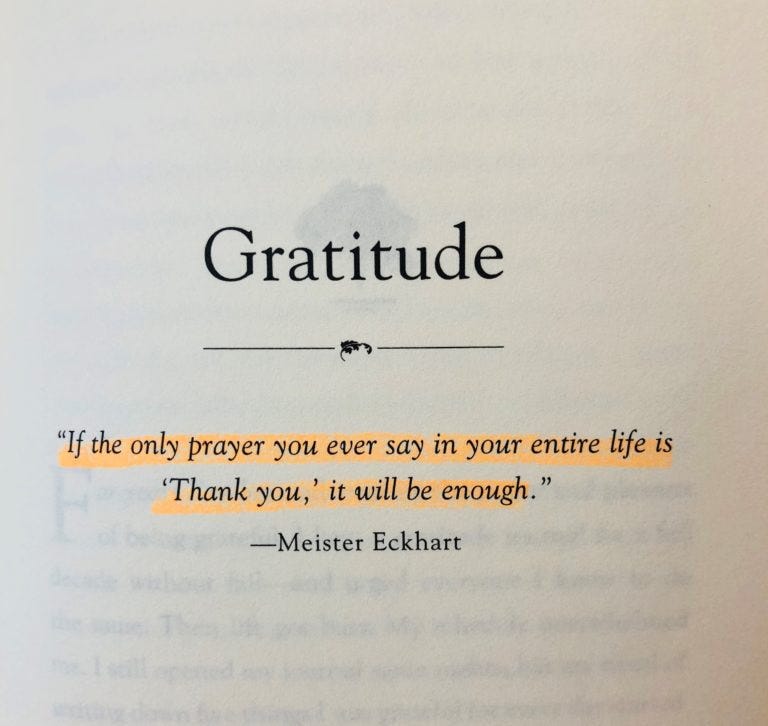Experimenting with gratitude
Q: Can you share your gratitude with someone this week?
In 12 years, I've never interviewed a single person who would describe their lives as joyful, who would describe themselves as joyous, who was not actively practicing gratitude. — Brené Brown
The power of gratitude has been talked about by many different spiritual leaders, social psychologists, and researchers. It is a practice mentioned alongside mindfulness as something that helps bring us into the present and provides us with an opportunity to shift our way of looking at the world. Gratitude is a way of appreciating what we have instead of focusing on what we lack.
There are many ways to bring this practice into your life - from starting your day with 3 things you are grateful for, keeping a gratitude journal, doing a dinner table practice with your family, delivering a thank you letter to someone in your life.
Over the years we’ve both tried different ways of incorporating a gratitude practice into our life. Our various gratitude lists (google Docs, journals, notion, etc.) have entries spanning several years but have huge gaps in between. The reality is that we’ve found it hard to maintain the practice of doing it consistently. So this month we experimented with a new format and structure in an attempt to solve the stickiness problem.
This aligns with our desire to experiment with new ideas as we contemplate building something useful for our community. Over the past two years, we have been intrigued by the power of spoken word and the ability for audio to transport the listener into the speaker’s world. As we talked about in our first post, we are also looking for ways to engage people in conversation and build connection to themselves and others. So what if we experimented with how we practiced gratitude to test some ideas out?
Format: What helps our brain hold onto positive moments? Is writing the best way to reflect and remember our experiences or is there power in speaking out our thoughts aloud as if in conversation?
Accountability: Does sharing our gratitude within a group encourage us to stick with the practice?
Consumption: Does listening to other people’s reflections allow for people to resonate with each other’s stories? How does it feel to hear someone else's words of appreciation for you?
We designed a week-long experiment on gratitude by collecting responses to “what three things are you grateful for today?”
Format: Audio messages on WhatsApp
Sharing: Private group of four (two of us along with our partners)
Here are some of our initial learnings from running this for just seven days.
Format
Reflecting on what we are thankful for requires pausing as our brain sifts through various experiences of the day. It felt awkward to take those pauses in audio as we went deeper into each reflection.
Accountability
Seeing someone else's gratitude come in on the group chat helped trigger a response encouraging others to record and send in theirs.
Consumption:
All of us felt that listening to someone’s reflection was a much richer experience and transported us into the other person’s shoes.
It felt great thanking someone in our reflection, knowing that the person would be hearing it soon. And on the flip side, being acknowledged in someone’s gratitude made us feel valued and appreciated. This made us feel closer to each other.
It was fun to run an experiment as we continue to explore new ways of engaging in dialogue in small and large groups. Running this scrappy experiment for seven days helped us recognize the limitations of audio as a format while strengthening our faith in small group conversations. It also made us wonder if sharing in a group can sometimes lead to a more filtered list of reflections vs a personal practice.




What a fantastic experiment! My daily gratitude practice has certainly improved my outlook - I’m more positive and joyous! I worry less about what I’ve said or how someone might perceive something. I feel more grounded. I might start this in a group I’m in who are doing the Inner MBA via Sounds True 🤩